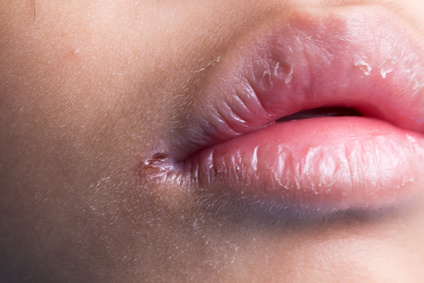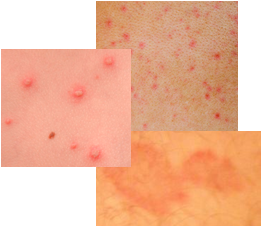- Home
- Angular Cheilitis
Angular Cheilitis
Visit this
PICTURES OF RASHES PAGE
What is Cheilitis?
Angular cheilitis is a fairly common skin problem that affects the lip area of the face. It is found at the corner of the mouth at the lip and facial skin junction. Inflammation, burning, redness, and ulceration or cracks characterize the lip skin care problem of angular cheilitis, which may also be known as cheilitis.

The affected area is often very itchy and painful. In more advanced cases, the cracks can bleed when the mouth is opened. These open lesions may subsequently form a crust as they start to heal or can become infected. Because of these symptoms and where the problem is located, activities such as eating and speaking can cause significant discomfort and make the problem worse.
What Causes Angular Cheilitis?
There are a variety of reasons why angular cheilitis occurs. It can be caused by a fungal (Candidiasis) or yeast infection, but also from bacterial (Staphylococcal) or viral infections. People taking the medication isotretinoin for acne are more vulnerable to cheilitis caused by fungal or bacterial infections.
It can also occur in people who wear dentures that do not fit properly. The friction and folds created by improperly fitting dentures can lead to cheilitis. Also, dentures that do not fit properly prevent the proper closure of the mouth leading to saliva build-up at the mouth corners and infection.
Angular cheilitis may be caused by deficiency in vitamin B-2 (riboflavin), vitamin B-3 (niacin), vitamin B-6 (pyridoxine), or vitamin B-12 (cyanocobalamin), deficiency in iron, constant lip licking, lip biting, thumb sucking, bottle feeding, sucking on pacifiers, loss of teeth, sun exposure, wind and cold air exposure, or a weakened immune system as can be caused by conditions such as HIV. Certain skin conditions such as atopic or seborrhoiec dermatitis may make an individual more vulnerable to cheilitis. Contact allergies caused by toothpastes and cosmetics can also cause this lip problem. Some foods or drinks such as orange juice can exasperate the problem.
Cheilitis Lip Problem Treatment
Angular cheilitis can be treated or prevented in a number of ways depending on the cause of the problem. For example, avoiding irritating the lips by constant lip licking or lip biting are very effective prevention techniques. Using a moisturizing lip balm with UV protection when out in the sun or cold is also very important. Other activities such as thumb sucking in young children or use of a pacifier should be eliminated. If a cosmetic or certain toothpaste is triggering irritation or an allergic response then their use should be discontinued.
If the cheilitis is caused by a fungal or bacterial infection, then topical anti-fungal or anti-bacterial medicated gels can be applied to the affected areas. Consult with a pharmacist or physician with regards to this type of treatment.
If a deficiency in the B vitamins is detected, then this should be addressed either by supplements or by focussing on foods that provide the B vitamins. For example, vitamin B-2 can be obtained from dairy products, cereals, brewer’s yeast, meats (especially organ meats), and certain leafy green vegetables. Vitamin B-3 and B-6 can be obtained from beans, rice, peanuts, fish, eggs, lean meats, and several other foods. In addition, B6 can be obtained from sunflower seeds, bananas, potatoes, cauliflower, and cabbage.
Dentures that do not fit properly should be adjusted to prevent lip irritation via friction and to allow the mouth to properly close. This will prevent saliva build-up on the corners of the mouth. The corners of the mouth should be kept dry to allow the cheilitis to heal.
More Information on Lip Treatments and Lip Skin Care
For more information on lip problems other than cheilitis visit the lip skin care page by clicking here.
